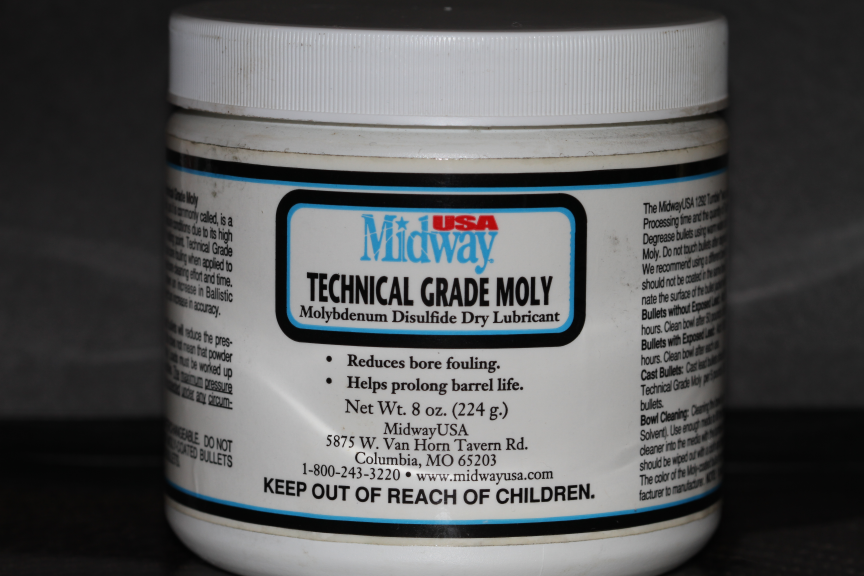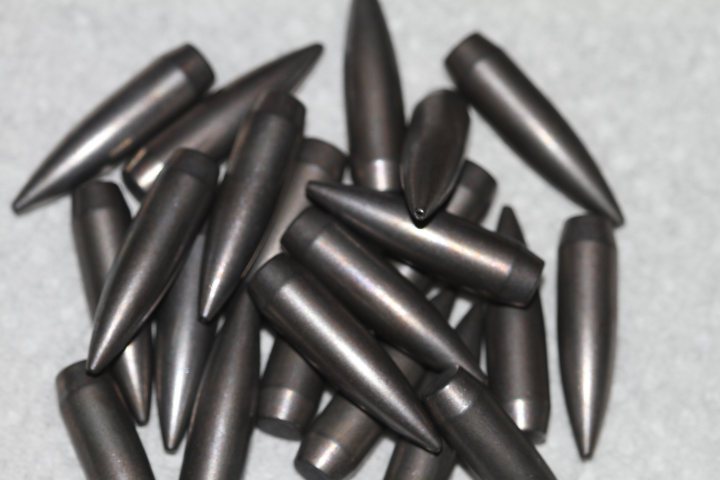You are using an out of date browser. It may not display this or other websites correctly.
You should upgrade or use an alternative browser.
You should upgrade or use an alternative browser.
moly coated bullets ?
- Thread starter rebs
- Start date
I have tumble coated bullets with Molybdneum powder.
{Edit: Please read the board policy on posting copyrighted materials.}
If you're thinking about it on bare lead bullets, forget about it, it will leave one heck of a mess.
It's ment for jacketed bullets and pretty much a waste of time.
I had the kit above for 3 days before I sent it back and its discontinued now.
There are a number of other bullet coatings out there for cast/swaged bullets that work from good to great but they are not just "moly".
{Edit: Please read the board policy on posting copyrighted materials.}
If you're thinking about it on bare lead bullets, forget about it, it will leave one heck of a mess.
It's ment for jacketed bullets and pretty much a waste of time.
I had the kit above for 3 days before I sent it back and its discontinued now.
There are a number of other bullet coatings out there for cast/swaged bullets that work from good to great but they are not just "moly".
Good article on it here:
http://www.theboxotruth.com/educational-zone-99-moly-coating-rifle-bullets/
http://www.theboxotruth.com/educational-zone-99-moly-coating-rifle-bullets/
I started moly coating copper jacketed and cast bullets in the late 1980's using "Neco Coat" poducts. The idea was that the moly would occupy imperfections in the bore, block copper adherence, and ease cleaning as a result. It was not an unreasonably difficult procedure; add moly to steel balls to a dedicated tumbler to which you threw in your bullets. They came out out a sleek black color and looked sufficiently different to cause one to continue the process.
Adjustments in powder loads were required as the moly provided enough lubricity to decrease the transit time in the barrel, thus reducing velocity. It did nothing to improve accuracy, as far as I could tell.
Cleaning was interesting because one could not ascertain when the barrel was clean since the patches were perpetually black. Discussions in the publication, "Precision Loading" eventually suggested chemical changes due to high temperatures in the leade might cause erosion or pitting and the hygroscopic nature of moly might cause rust.
I had a 7mm STW that shot on a dime but accuracy suffered with continued use of moly coated bullets. Since I could wash the moly off my hands with soap and water I figured I could do the same with my barrel. I cleaned it nightly for 7 consecutive nights to no avail.
I think it makes more sense- if any- to simply moly coat the barrel rather than the bullets, to prevent the accumulation of moly with repeated shots but I have long given up on any attempt to prove the difference.
Adjustments in powder loads were required as the moly provided enough lubricity to decrease the transit time in the barrel, thus reducing velocity. It did nothing to improve accuracy, as far as I could tell.
Cleaning was interesting because one could not ascertain when the barrel was clean since the patches were perpetually black. Discussions in the publication, "Precision Loading" eventually suggested chemical changes due to high temperatures in the leade might cause erosion or pitting and the hygroscopic nature of moly might cause rust.
I had a 7mm STW that shot on a dime but accuracy suffered with continued use of moly coated bullets. Since I could wash the moly off my hands with soap and water I figured I could do the same with my barrel. I cleaned it nightly for 7 consecutive nights to no avail.
I think it makes more sense- if any- to simply moly coat the barrel rather than the bullets, to prevent the accumulation of moly with repeated shots but I have long given up on any attempt to prove the difference.
I am talking about the bullets from Midway USA that you can order with or without moly coating.
Moly coating was a rage a little over 20 years ago during the early 90s. Many still pursue the practice. I tried it and dedicated a tumbler to it. Midway USA sold the Technical Grade Moly (Molybdenum Disulfide) so one could roll their own "Moly Coated" bullets.

Below are some moly coated .308 Winchester 168 grain Sierra Match King bullets:

Today the hand loader has their choice of buying moly coated bullets or rolling your own. Molybdenum Disulfide is a dry powder lubricant. The idea was it would prolong barrel life and reduce fouling. If I recall correctly the shooter would scrub their barrel completely removing any and all fouling and then begin shooting the moly coated bullets. Personally I never noticed much difference in accuracy or my velocities for given loads over the chronograph.
If you want to try some pre coated I would say have at it as it won't hurt anything to try them. If rolling one's own be aware the stuff can get real messy. As a dry powdered lubricant it is frequently mixed with alcohol (the alcohol serves as a carrier) and applied to threaded surfaces under the name Neolube.
Ron
Reduced fouling
increases barrel life
Cures rheumatism
I have been watching videos about the rigors of scientific method. I like Richard Feynman, Paul Steinhardt, and Roger Penrose.
I speculate that Carl Sagan saying a nuke test would cause nuke winter set off Feynman to do stand up comedy like lectures about what is bad science.
Step 1
Guess
increases barrel life
Cures rheumatism
I have been watching videos about the rigors of scientific method. I like Richard Feynman, Paul Steinhardt, and Roger Penrose.
I speculate that Carl Sagan saying a nuke test would cause nuke winter set off Feynman to do stand up comedy like lectures about what is bad science.
Step 1
Guess
